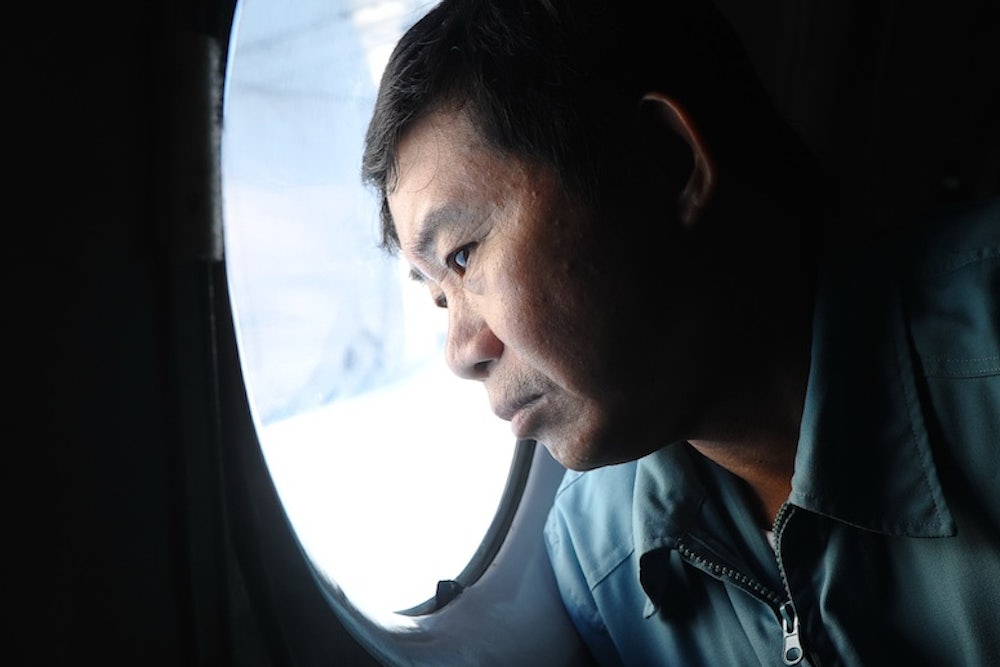The reporter was spinning the pasta and clams around on his fork.
“A plane going down is not supposed to be a mystery,” he told me over dinner recently, marveling that Malaysia Airlines Flight 370 still had not been found after disappearing a week ago.
“The only thing more troubling than a surveillance state,” he went on, “is one that can keeps track of all your Gmail contacts but can’t keep track of a plane falling out from the sky. What the fuck?”
What the fuck, indeed. Why is it so easy to click around the world and see what’s going on in, say, downtown Cophenhagen or the backroads in northern Tasmania and not find a Boeing 777, an aerial opus of engineering and technology with a takeoff weight of half a million pounds and the wing span of a 20-story building? But this dissonance doesn't entirely explain the frenzied mediascape surrounding the story. I've found myself asking a different question: Do we really want to find this missing plane at all? The families of the victims deserve answers, of course, but as the days go on and more nautical miles are searched for missing debris, there’s an undeniable urge for investigators to keep on looking, not find anything, and let the mystery endure.
The New York Times's Farhad Manjoo argues that the "terror" isn't only that we can't find the plane, but being off the grid itself, untethered to our friends and family. I disagree. Our "hyperconnectivity," as he calls it, is the very reason we need this mystery right now. In a moment dominated by the radical adoption of new technology, with reports of the NSA’s massive snooping, talk of Amazon drones making deliveries like toilet paper door to your doorstep, or checking the status of a flight through a pair of Google glasses, we need to feel that there is at least something out there that the grand orchestra of satellites and supercomputers can’t find or figure out.
It's more than a tad ironic, but apropos, that it took a missing airplane—one of man's greatest technological innovations—to remind us that there's still some mystery left to humanity. As The Onion wrote Thursday, investigators are not only considering mechanical failures or terrorist plots but “the overarching scope of space, time, and humankind’s place in the universe,” the site reported, and that people are demanding answers to questions about the flight's duration, path, and "the very dimensions of space-time and the nature of reality, and what exactly it is that brought us into existence and imbued us with this thing we call life."
That joke's not far off. There’s a precedent for missing airplanes prompting big, existential questions—well before "Lost" became a hit TV show. After World War II, as planes became larger and faster, slews of flights were seemingly swallowed by the sea. Navy bombers, search-and-rescue missions—all types of airplanes disappeared, many in the western part of the Atlantic that became known as the Bermuda Triangle. The legend of vanished planes only heightened the national anxiety over flying, prompting airlines to sex-up stewardesses to ease passengers nerves. Perhaps it was against God’s wishes, many thought, for man to fly like birds.
The hijacker era in the late 1960s and early '70s, in many ways, was a protest against the increasing size of the flying machines and the big companies making them. In the fall of 1971, as jumbo jets were rolling off the production lines at Boeing, the hijacker known as D.B. Cooper boarded a plane in the Pacific Northwest, ransomed the passengers for bags of cash, and parachuted out midair, never to be seen again, he became a cult hero. Cooper was, in the words of a sociologist back then, “one individual overcoming, for the time being anyway, technology, the corporation, the system.”
MH370 carries a similar spirit.
“We’ve built this facade that man is in control of all things,” says John Little, a curator and researcher at the Museum of Flight in Seattle. “Well, look at this: a Boeing 777 falls off the map and half the world is looking for it and they can’t find anything! If this can happen, well, then, maybe there is a place for the individual.”
The difference between Cooper’s jump and MH370, Little points out, is that since the early 1970s virtually every square foot of our planet has been mapped by satellites. Tracking systems on the Web and on smartphones are so advanced that it’s virtually impossible for anyone to disappear for too long any more. “The real downside of computers is that they’ve deprived the human race of hiding places,” Little says.
Wherever the Malaysia Airlines plane is, it found a hiding place. And the longer it takes investigators to discover where it is and what went wrong, the longer we have to indulge in the fantasy that we too might be able to elude the computers tracking our clicks, text messages, and even our movements. Hidden from the rest of the world, if only for an imagined moment, we feel what the passengers of Flight 370 most likely don't: safe.
